
PHYTON-ANNALES REI BOTANICAE
metrics 2024
Connecting researchers with groundbreaking botanical findings.
Introduction
PHYTON-ANNALES REI BOTANICAE is a distinguished journal dedicated to the fields of plant science and ecology, published by Ferdinand Berger Soehne. With its origins tracing back to 1994, this journal has carved a niche in disseminating vital research findings and innovative studies pertaining to botany and environmental biology, despite its coverage being discontinued in Scopus since 2016. The journal's impact extends across various disciplines, reflected in its rankings within the categories of Agricultural and Biological Sciences and Environmental Science, underscoring its commitment to advancing knowledge in plant sciences. While it is not an open-access journal, its rigorous peer-review process ensures high-quality research that is valuable for researchers, professionals, and students alike. Located in Horn, Austria, PHYTON serves as a pivotal platform for sharing significant contributions to the field, fostering a deeper understanding of plant biology and ecology.
Metrics 2024
 -
- 0.10
0.10 0.40
0.40 -
-Metrics History
Rank 2024
Scopus
IF (Web Of Science)
JCI (Web Of Science)
Quartile History
Similar Journals
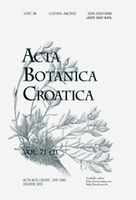
ACTA BOTANICA CROATICA
Unlocking Nature's Secrets through Open AccessACTA BOTANICA CROATICA is an esteemed interdisciplinary journal dedicated to the exploration and advancement of botanical sciences, published by UNIV ZAGREB, FAC SCIENCE, DIV BIOLOGY. Since its inception, this journal has embraced an Open Access model, enabling researchers and the global scientific community easy and unrestricted access to cutting-edge findings in plant biology, ecology, and evolutionary studies since 2011. Covering a broad spectrum from plant science to ecological and evolutionary behavior, ACTA BOTANICA CROATICA holds an important position in the academic landscape, currently classified in the Q3 quartile for both Ecology, Evolution, Behavior and Systematics and Plant Science categories. With a robust ranking in Scopus, it stands at #246 out of 516 in Plant Science and #360 out of 721 in Ecology, showcasing its commitment to quality research dissemination. The journal invites contributions from researchers, professionals, and students aiming to broaden the horizons of botanical research and foster collaboration within the scientific community.
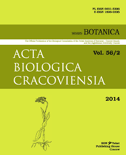
ACTA BIOLOGICA CRACOVIENSIA SERIES BOTANICA
Advancing plant science through rigorous research.ACTA BIOLOGICA CRACOVIENSIA SERIES BOTANICA is a distinguished journal published by the Polska Akademia Nauk (Polish Academy of Sciences), with its roots tracing back to 1996. As a pivotal publication in the field of Plant Science, it serves to disseminate high-quality research and findings, contributing to the ongoing development and understanding of biodiversity, plant ecology, and conservation. The journal is indexed under Scopus, ranked #203 out of 516 in its category, placing it in the 60th percentile and firmly within Q3 quartile for Plant Science in 2023. Researchers, professionals, and students will find invaluable content within its pages, enhancing their knowledge and supporting academic exploration. Although it currently does not offer open access options, the journal remains a crucial resource for those engaged in botanical sciences, with a commitment to advancing scholarship in Poland and beyond.
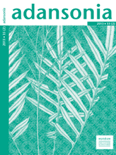
ADANSONIA
Pioneering discoveries in plant science since 2000.ADANSONIA is a distinguished, peer-reviewed open access journal dedicated to advancing the field of plant science. Published by the Publications Scientifiques du Museum in Paris since 2000, this journal serves as a critical platform for sharing innovative research and discoveries in botany, ecology, and related disciplines. With its ISSN 1280-8571 and E-ISSN 1639-4798, ADANSONIA boasts a notable Scopus rank of #383 in the Agricultural and Biological Sciences category and a 2023 category quartile ranking of Q3 in Plant Science, indicating a meaningful contribution to the academic community. The journal's scope encompasses a broad range of topics, making it a vital resource for researchers, professionals, and students alike who are exploring the complexities of plant biology. Based in France, ADANSONIA not only enhances visibility for groundbreaking research but also facilitates open communication amongst scholars, ensuring that knowledge on plant science is accessible worldwide. Located at CP 39-57, Rue Cuvier, F-75231 Paris Cedex 05, France, this journal stands as a testament to the collaborative efforts in the pursuit of scientific excellence in plant sciences.

BANGLADESH JOURNAL OF BOTANY
Nurturing the Future of Botanical ResearchBANGLADESH JOURNAL OF BOTANY is a prominent publication in the field of plant sciences, dedicated to advancing research and knowledge within the botanical community. Published by the BANGLADESH BOTANICAL SOC, this journal serves as a vital platform for researchers and scholars seeking to disseminate their findings related to plant biology, ecology, and conservation practices, particularly within the unique context of Bangladesh's diverse flora. With an ISSN of 0253-5416 and an E-ISSN of 2079-9926, the journal encompasses a wide scope of topics, reflecting interdisciplinary approaches in botanical research. Since its inception, with convergence periods from 1996 to 2001 and from 2003 to 2024, it has garnered recognition, positioned in the Q4 category in the Plant Science field with a ranking of #459/516 in Scopus, indicating its contribution to the field despite its developing impact. Operating within Bangladesh, at the UNIV DACCA DEPT BOTANY, the journal provides a crucial insight into the ecological and agricultural implications of plant studies in the region, catering to the needs of academics, professionals, and students eager to engage with contemporary botanical research.

Mediterranean Botany
Exploring the Richness of Mediterranean FloraMediterranean Botany is a distinguished peer-reviewed journal dedicated to the flourishing fields of Ecology, Plant Science, and Ecology, Evolution, Behavior and Systematics. Published by the Universidad Complutense de Madrid, Servicio Publicaciones, this Open Access journal has been disseminating valuable research since 2018, ensuring that findings are accessible to a global audience, with an emphasis on Mediterranean vegetation and biodiversity. With an ISSN of 2603-9109, it contributes significantly to the academic discourse in its category quartiles, recently featuring in Q3 for Ecology and related fields. Notably, Mediterranean Botany ranks within the top half of its category in Scopus, highlighting its relevance and contribution to the scientific community. Researchers, professionals, and students alike will find the journal to be a vital resource for latest discoveries, trends, and conservation strategies in Mediterranean ecosystems, positioning it as an essential platform for advancing knowledge and fostering collaboration within the plant sciences.

NORDIC JOURNAL OF BOTANY
Exploring Botanical Frontiers with Innovative ResearchNORDIC JOURNAL OF BOTANY, published by WILEY, is a distinguished journal that serves as a vital platform for the dissemination of innovative research in the fields of Plant Science and Ecology, Evolution, Behavior and Systematics. With an ISSN of 0107-055X and E-ISSN 1756-1051, this journal has been a crucial part of the academic landscape since its inception in 1981, continuing to contribute significantly to the literature up to 2024. NORDIC JOURNAL OF BOTANY holds a commendable Q2 ranking in Plant Science and Q3 in Ecology, which underscores its impact and relevance in the scientific community. Despite the absence of Open Access options, the journal offers robust access features that ensure researchers and readers can easily engage with its meticulously curated content. Aimed at both seasoned professionals and emerging scholars, the journal not only publishes high-quality articles but also fosters collaboration and knowledge exchange across various related disciplines, thereby solidifying its role as a cornerstone in botanical and ecological research.
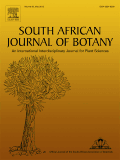
SOUTH AFRICAN JOURNAL OF BOTANY
Unveiling the Secrets of South African FloraThe SOUTH AFRICAN JOURNAL OF BOTANY, published by Elsevier, is a distinguished peer-reviewed journal that serves as an essential platform for the dissemination of high-quality research in the field of plant science. With an ISSN of 0254-6299 and an E-ISSN of 1727-9321, this journal has been a vital contributor to the scientific community since its inception in 1982, continuing to publish pivotal research findings up to 2024. Recognized in the Q2 category of Plant Science for 2023, and ranked 106 out of 516 in Scopus, this journal occupies the 79th percentile in its field, reflecting a strong commitment to advancing botanical sciences. Although it is not an open-access publication, it provides crucial insights and advancements that benefit researchers, professionals, and students alike. As the journal continues to evolve, it remains an invaluable resource for those dedicated to exploring the complexities of plant biology within the broader scope of agricultural and biological sciences.

PLANT SPECIES BIOLOGY
Unveiling the Secrets of Plant Biology and EcologyPLANT SPECIES BIOLOGY, published by WILEY in the United Kingdom, is a prominent journal dedicated to advancing the understanding of plant species, their biology, ecology, and roles within ecosystems. With an impressive convergence of research dating back to 1986 and extending through 2024, this journal caters specifically to specialists in the fields of plant science and ecology. The journal's current impact factor further underscores its significance, ranking in the Q2 quartile across three relevant categories: Ecology, Ecology, Evolution, Behavior and Systematics, and Plant Science. As a member of the Scopus ranks, it holds respectable positions within its categories, evidencing its contribution to impactful scientific discussions and knowledge. Although it is not an open-access journal, PLANT SPECIES BIOLOGY provides essential insights, fostering interdisciplinary dialogue and discovery for researchers, professionals, and students dedicated to exploring the complexities of plant species and their ecosystems.
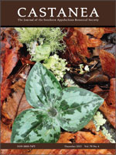
CASTANEA
Illuminating the Secrets of Southern Appalachian FloraCASTANEA is a distinguished journal published by the SOUTHERN APPALACHIAN BOTANICAL SOCIETY in affiliation with NEWBERRY COLLEGE. With an ISSN of 0008-7475 and an E-ISSN of 1938-4386, this esteemed publication serves as a vital platform for researchers and practitioners in the field of Plant Science. It has been circulating since 1982, and its scope focuses on the study of trees, their ecology, and conservation, thereby contributing significant insights into the biodiversity of the Southern Appalachian region and beyond. Despite its current ranking in the Q4 quartile and the 5th percentile in the Scopus Agricultural and Biological Sciences category, CASTANEA is committed to advancing knowledge and fostering a deeper understanding of plant sciences among academics and students alike. The journal does not currently offer Open Access options, maintaining a traditional subscription model that allows for carefully curated and peer-reviewed content. As you explore the advances in plant biology through CASTANEA, you will find an invaluable resource that supports both emerging and established scholars in their research endeavors.
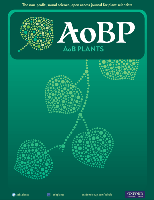
AoB Plants
Innovating research for a greener tomorrow.AoB Plants is a distinguished open-access journal published by Oxford University Press, dedicated to advancing the field of plant science. Since its inception in 2009, this journal has played a pivotal role in disseminating high-quality research that encompasses a wide range of topics including plant biology, ecology, and biotechnology. With an impressive impact factor and a ranking in the Q1 quartile for Plant Science, AoB Plants is recognized for its innovative contributions and scholarly rigor, ranking #129 out of 516 in the Scopus Agricultural and Biological Sciences category, placing it in the 75th percentile among its peers. By promoting open-access availability of research findings, the journal empowers researchers and practitioners alike, facilitating greater collaboration and knowledge sharing in the global scientific community. Situated in the heart of the United Kingdom, AoB Plants continues its commitment to providing a platform for pioneering research and developments in plant science, thus fostering a deeper understanding of the crucial roles that plants play in our ecosystems and economies.